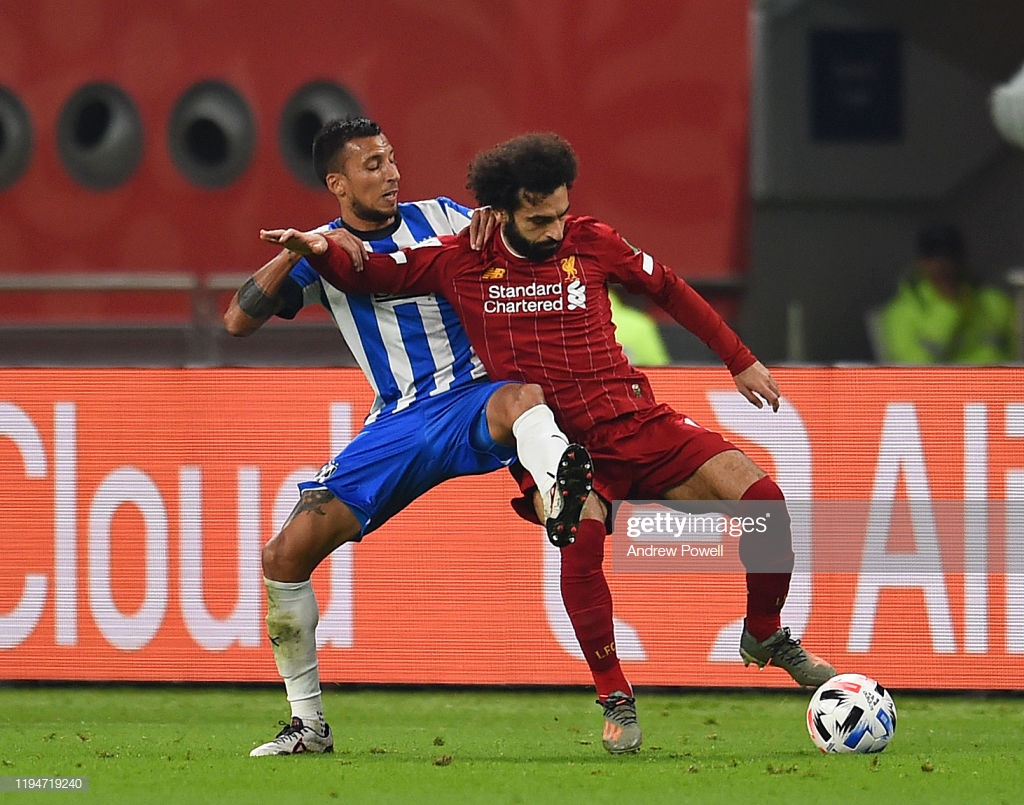Liverpool completed their second match inside twenty-four hours on Wednesday night, edging past Monterrey, the CONCACAF champions from Mexico, in their Club World Cup semi-final.
Roberto Firmino’s late winner ensured a 2-1 victory for the Reds and, perhaps just as importantly, meant Liverpool avoided a draining extra-time period and a possible penalty shoot-out.
Monterrey not far away from shocking the Reds
Although Liverpool were often too slow and sluggish, they still controlled the game and produced moments of quality which ultimately resulted in the two goals they needed to progress to the final.
Moreover, Monterrey were excellent throughout, perhaps taking the Reds by surprise with their level of play. The Mexican side defended stoutly throughout, maintained their organisation and pressed at the right times, troubling an uncertain Liverpool defence.
With Virgil van Dijk missing through illness and Trent Alexander-Arnold rested, Liverpool’s backline consisted of James Milner at right-back and Jordan Henderson in the centre of defence, with Joe Gomez, recently Liverpool’s fourth choice central defender, the only fit centre-back at present. Of Liverpool’s strongest back four from recent months, only Andrew Robertson started against Monterrey.
The new partnerships caused issues with Liverpool’s structure at the back, with Henderson understandably not providing the correct defensive shapes at times – after all, he is a central midfielder, not a van Dijk. Consequently, Monterrey had a number of chances to score a second, with Alisson the busier of the two goalkeepers on the night, hence his man of the match award.
In the end however, Liverpool got the job done, yet again, with a goal right at the death, yet again. The Reds love their dramatics, but a win is a win and Jürgen Klopp’s side move onto Saturday’s final against Flamengo.
Experience trumps youthful talent at Villa Park
By contrast, the first of Liverpool’s two games inside a day did not go quite as well, losing 5-0 to Aston Villa in the quarter-finals of the League Cup.
With the first-team squad in Qatar, Klopp decided to field a team of youngsters who, thanks to Herbie Kane, had more appearances for Doncaster Rovers than the Liverpool first-team. Even some of Liverpool’s most prominent youngsters were unable to take part at Villa Park – Rhian Brewster and Yasser Larouci were injured, while Neco Williams and Curtis Jones travelled to Qatar.
However, the likes of Kane, Harvey Elliott, Sepp van den Berg and Ki-Jana Hoever all started against Villa, with the chance to impress against senior professional players with Premier League experience.
Liverpool’s youngsters played well and impressed statistically at least, with more possession, shots, shots on target and corners than their experienced opponents. Yet Villa were clinical and took advantage of mistakes in Liverpool’s young defence, while enjoying some luck along the way, highlighted by Morgan Boyes’ own goal for Villa’s second of the night.
Liverpool’s youngsters would have been disappointed by the result and the margin of the scoreline but they should be encouraged by the manner of their performance, their resilience in the second half and the chances they did create going forward, with Elliott in particular impressing.
Liverpool’s Under-23 boss and stand-in manager at Villa Park, Neil Critchley, will undoubtedly stress the positives to his young Reds and we are likely to see a number of these youngsters make appearances for the first-team in the future. Elliott and Hoever have already featured in the first-team squad in the Premier League, alongside Brewster, Jones and Williams, while the likes of van den Berg could step up as well in the future.
Club World Cup – if you are in it, then win it
Despite the heavy defeat at Villa Park, Liverpool and Klopp made the correct decision to focus on the Club World Cup at the expense of the League Cup.
Playing two games in a day would have been impossible for the regular first-team squad and fielding two hybrid sides of regulars and youngsters against Villa and Monterrey would have risked elimination from both competitions.
Ultimately, Liverpool already have eight League Cup titles, more than any other team in the history of the competition. Additionally, the League Cup is an annual competition which Liverpool take part in automatically – at least for now in its current guise.
Looking ahead, with France and Portugal removing their tertiary domestic competitions recently, who knows if there will be a place in the calendar for the League Cup in the years to come, particularly for clubs who qualify for European football.
Regardless, Liverpool have an unprecedented history with the League Cup, but have never won the Club World Cup, a competition where you have to win the Champions League to qualify. If it is not a once-in-a-lifetime occurrence for the club and the players, it is at least a rare occurrence.
Just two wins will make Liverpool world champions – a title dismissed in Europe but treasured by the rest of the world, especially South America.
Flamengo still passionately recollect their 1981 victory in this competition, known then as the Intercontinental Cup, beating a Liverpool side with Kenny Dalglish and co. with Zico, Flamengo’s most illustrious player, leading the charge to the club’s greatest victory in their history.
With notable players such as Rafinha, Filipe Luis, Diego Alves and Gabriel Barbosa, Flamengo are desperate to ensure a repeat of their win thirty-eight years ago.
Having sacrificed the League Cup, Liverpool will also be desperate to exact long-awaited revenge and win the Club World Cup for the very first time, creating another piece of history for this current Liverpool side. They are threatening to become as great as the Liverpool teams in the 1970s and 80s, including the Liverpool teams who played in previous versions of this competition.
Certainly, where the teams from 1981, 1984 and 2005 failed, the class of 2019 can succeed.










































